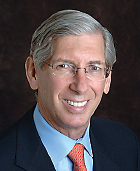Jay Scully Deserves Our Thanks For a Job Well Done
Abstract

Leading the national association for psychiatrists isn’t for the faint of heart. We can be a contentious group, not because we aren’t collegial, but because we have strong opinions about our chosen field of medicine. These opinions become particularly impassioned when psychiatry is faced with challenges and must adapt to change.
For more than a decade, Jay Scully has led APA as its chief executive officer and medical director (CEO/MD) through an extraordinary period of change. His calm manner, keen mind, consummate professionalism, and willingness to engage openly with members have helped the Association set a course to overcome challenges and maintain its focus on what is most important.
While his most notable contributions are from his time as CEO/MD, it’s important to note that his involvement with the Association has spanned his career. Prior to his term as CEO/MD, Jay served as a deputy medical director of APA and director of its Office of Education from 1992 to 1996.
Since he rejoined the APA staff in 2002, Jay has had to address head-on some of the most difficult issues that APA has ever encountered—APA’s finances, membership, and transparency of industry relationships. He strengthened the Association’s financial posture through a critical reorganization and creatively crafted policies to increase revenues and optimize resource allocation.
At a time when American medicine’s relationship with the pharmaceutical industry was being scrutinized, psychiatry became the poster child for medical conflict of interests. APA found itself squarely in the cross-hairs of a government inquiry led by Sens. Charles Grassley (R-Iowa) and Herbert Kohl (D-Wis.), and Jay steered APA and our profession through this crisis. With great integrity, he helped to restore public confidence. Under his leadership, APA eliminated industry-sponsored symposia at its annual meetings and restricted industry relationships of APA members serving on its clinical practice guideline committees and the DSM-5 Task Force and work groups.
Jay never forgot that his first responsibility as CEO/MD was to APA’s members and their patients—ensuring that education and advocacy were a priority. Jay and his staff tirelessly advocated for mental health parity and elimination of archaic or discriminatory restrictions that prevented psychiatrists from effectively treating their patients. We are now seeing the benefits of that long battle, both for our patients in coverage protected by the Mental Health Parity and Addiction Equity Act and the Patient Protection and Affordable Care Act, as well as the newly enlightened perspective of policymakers and the public about the importance of recognizing and treating mental disorders.
The effort required to achieve this success shouldn’t be underestimated. Jay stood firm in the face of critics of psychiatric treatment who are both a vestige and continued cause of the stigma surrounding mental illness. He was an unwavering supporter of the DSM-5 Task Force and its insistence that this edition be subject to the highest scientific and ethical standards and seek the full engagement of APA members, other physicians and mental health professionals, and patient-family advocates.
In doing so, Jay helped APA transition to the digital age, encouraging investment in technology that facilitated an unprecedented number of comments during the development of DSM-5. This new technology has permeated every level of APA in our electronic communications, publications, and educational offerings. We are now better suited to meet the needs of our younger members.
No one would be quicker than Jay to argue that he wasn’t alone in these efforts. He has built and inspired an excellent staff at APA and fostered a strong spirit of engagement among APA’s member leaders. Understanding that a good leader must listen and learn as well as talk and direct, Jay has never been reluctant to change when the circumstances have required it.
Over the past decade, circumstances have certainly required that APA rise and overcome seemingly insurmountable obstacles. As we look to the future, Jay can take pride in knowing that he is leaving the Association better positioned for the challenges ahead. We owe him a great debt of gratitude for his leadership and service, and wish him well as he kicks back and enjoys a less-demanding work schedule in his beloved South Carolina. ■
You can follow Dr. Lieberman on Twitter at @DrJlieberman. To do so, go to https://twitter.com/DrJlieberman, log in or register, and click on “Follow.”



